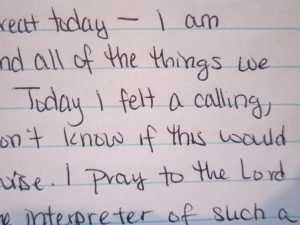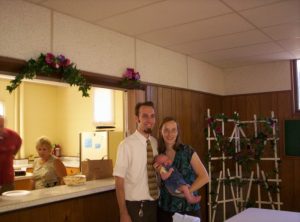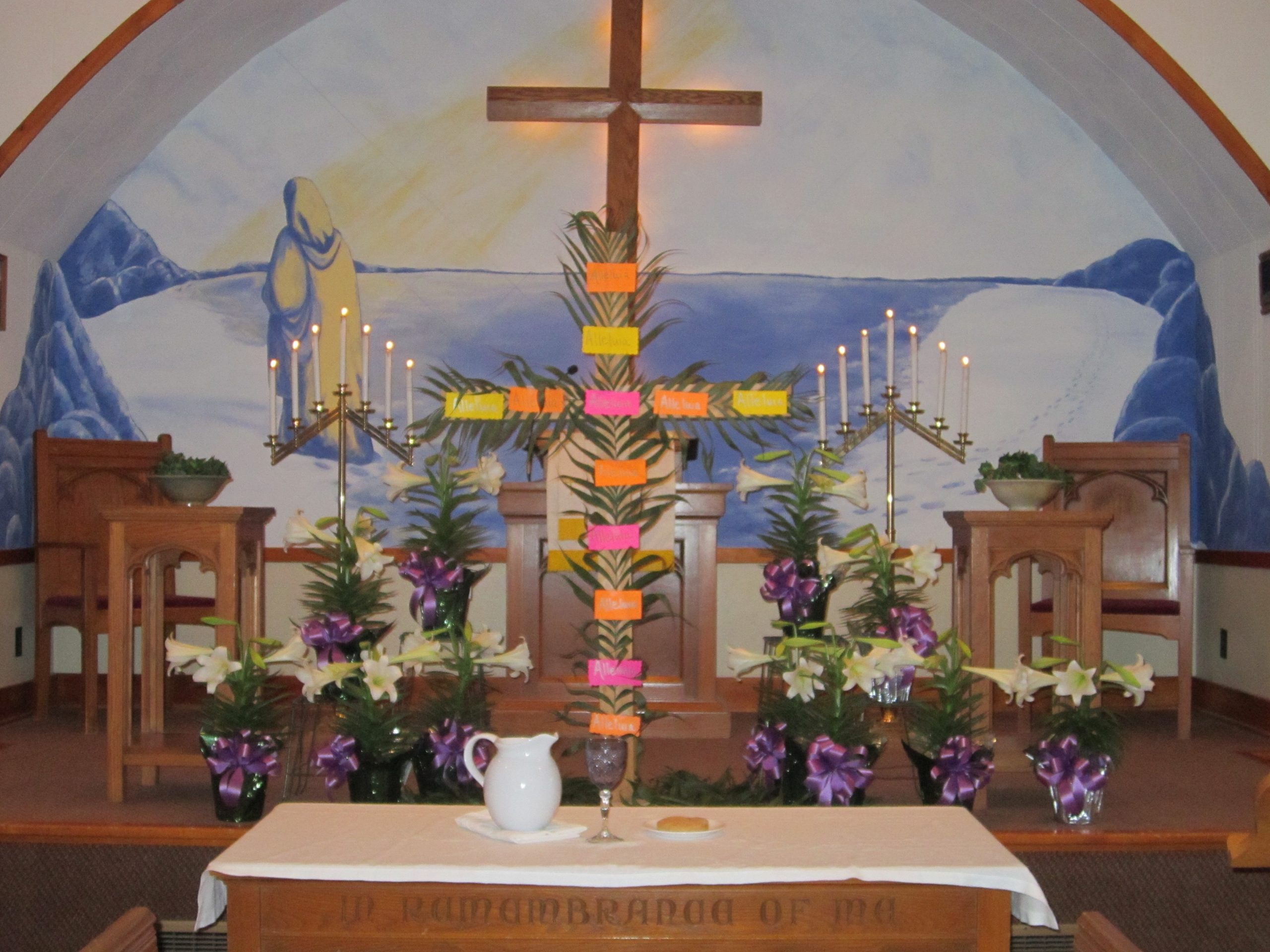Note: The word “Complementarian” is not my favorite. It is a loaded word that immediately raises defenses. By way of explanation for those who are unfamiliar with the term, complementarian is a theological worldview that suggests women are the complement of men. In this worldview, women are to submit to their husbands, and it is inappropriate for a woman to take on leadership roles in the church (specifically elder and pastor, though there are many complementarians who also do not believe women should be deacons).
Yesterday I found a wonderful article by Tamara Rice called “The Hole in Our Complementarianism.” I resonated deeply with much of what she described in an experience that tore a hole in her complementarian worldview, and as I read, I thought it might be helpful to some of my readers to describe my own calling into ministry.
In my growing-up years, I had a few different home churches. I was baptized as a toddler at an Episcopalian church (though, I didn’t know about that until I was in seminary). Later, I spent many formative years in a Disciples of Christ congregation, where I was baptized again at the age of eleven. I had no idea at the time that I had already been baptized, and that is another story for another day. I spent my high school years in a non-denominational church in Utah. I never had someone explicitly tell me that I was not allowed to be a pastor, but I had never heard a woman preach. I had also read passages from the Bible that talked about women not being allowed to speak in church, and about women needing to submit to their husbands.
My call into ministry began taking form when I was in elementary school, though I never would have described it as a “call” at that time. A family in our neighborhood had “Backyard Bible Club” every year, and I loved going. They had a praise band, made up of the mom, the dad, and their children. Every day we would sing songs, memorize Bible verses, play games, and read the next part of a story about a missionary’s journey. I vividly remember listening to one story about a missionary who had gone into a remote, jungle area and told people about Jesus. Even though I had never been much for adventure, and even though I’m an introvert and a homebody, I felt my heart stirring. “Could I be supposed to follow God’s voice into the jungle? Could it be that God would want me to grow up, stay single, and live among people I had never known?”
I mostly kept these wonderings to myself, but every now and then I would find myself thinking about it again. Could God call someone like me to do something for the sake of the Gospel? I remember many times sitting in church and listening to our pastor preach. I could feel God’s Spirit moving in me, and I was keenly aware of God’s presence with me. On a youth Sunday, I was asked to read Scripture. Even though I was very shy and didn’t say much in Sunday School, I agreed to be a reader. I stood up behind the pulpit with my knees shaking, and I spoke as confidently as I could while I read. After worship, several people told me that they just knew I would be used by God to be a reader in church. I even had someone suggest that I should think about preaching the next time youth Sunday came along.
I could read the Bible. Those words weren’t mine. But, preaching was never going to happen.
In high school, we moved to a new state and town. For the first time in my life, I was in the religious minority, and it was a very difficult transition for me. Add to that the normal awkwardness of high school and puberty, and I had some very trying years. During that time, I began to think about having a boyfriend, and wondering who God might lead me to marry.
I started attending a Bible Club once a week before school started. The leader of that group (a high school girl who was a couple of years older than I was) led several studies about dating and marriage. For the first time, I started to think that if I was going to be a Christian and have a godly marriage, I had to learn to submit myself to my husband. Even though I had always been taught by my parents that women could do anything men could do, I liked the idea of submission. As a timid, quiet girl, I found a tremendous amount of comfort in the idea that if I married a strong, winsome man, I may never have to stand up for myself or make difficult decisions on my own again.
After I graduated from high school, I moved across the country to study at an evangelical Christian liberal arts college. During that time, I repeatedly found myself involved in conversations about the importance of women’s submission, the evils of women’s ordination, and the importance of marrying a strong, Christian man who would lead the family. Surprisingly, the more I heard this message, the more I began to question whether or not God really had these desires and plans for Christian marriages. As part of my required curriculum, I had a course on the interaction of theology and culture.
At the time I took this class, I was also in the habit of writing in my journal every evening. In 2001, when I was still heavily enmeshed in a worldview that told me women must submit, men must lead, and women could never use their gifts as church leaders, I wrote this in my journal: “Today I felt a calling, a calling towards ministry. I don’t know if this would be music ministry, or otherwise. I pray to the Lord of Hosts that He may be the interpreter of such a calling!”

Calling. Somehow in the midst of a worldview that told me I couldn’t be called, in the middle of a class that was being taught by someone who probably never thought I could be called, God spoke to me and confirmed to me that I was called to ministry. And, then I immediately excused the thought of pastoral ministry, and decided it must be music ministry, or something more “appropriate” for a woman to do.
For the first half of my college studies, I was a music major in the rigorous music conservatory. Through a series of events, including a doctor telling me that I needed to quit playing the clarinet so many hours a day if I wanted to be a healthy person, I changed my major.
In the communications department, I found myself in speech courses, but also in courses about abusive relationships and gender stereotypes. During my Introduction to Speech course, we did a unit on persuasive speeches. One young man got up and gave a speech on why women’s ordination was an abomination. Afterwards, our class was invited to give feedback and ask questions. All of the feedback was positive. People were cheering the speaker on, adding their own two cents as to why women should never lead in the church, and then someone used my least favorite phrase: “The Bible is perfectly clear that any woman who leads in the church or her family is sinning in doing so.”
Those words rang in the air for a brief moment, and then the person who was sitting right behind me spoke up with confidence. She said, “Both of my parents have doctorates in biblical studies and interpretation. And they both believe that a truer reading of the Bible suggests women can be just as called to church leadership as men.” Tamara Rice talked about a hole being torn in her complementarian worldview, but when this classmate of mine spoke up, my complementarian worldview was nearly shattered. I knew God was calling me, and I knew how desperately I wanted to be faithful to God. The only thing that was holding me back was an intense yearning to be faithful to God’s Word. If the Bible said I couldn’t preach, I would never preach, even if the fire burning within me told me otherwise. Suddenly, I knew that there were two people in the world who had studied these texts in great detail, and did not come to the conclusion that women were barred from church ministry.
At the very end of my undergraduate studies, as my husband was preparing to start seminary, one of my professors asked to me to job shadow a female pastor. I resisted. I told my professor that even though I was in the process of applying to seminary, I had no interest in preaching. The truth was, I was too afraid to do something that I knew was going to be controversial. In all the personality testing I had to do as I entered seminary, one of my most well-defined personal struggles was identified as being a people-pleaser. I knew that if I preached, people would take exception to me before I even opened my mouth. I’d step behind the pulpit, everyone would know I was female, and they would judge me, my faith, my heart immediately. And that scared me.
My professor made it non-negotiable for me to job shadow a female pastor. Reluctantly, I did. And, it made me never, ever want to be a pastor. I saw the pain this pastor dealt with, and it scared me. When I was accepted to seminary, I decided that it was a stepping stone to doctoral studies, and the only sermons I would ever preach would be the ones required for graduation.
My first semester of seminary was academic and theoretical. I loved the reading, and the papers were challenging, and as a lifelong learner, I was in heaven. But, second semester pushed on the cracked complementarian worldview I had, and pieces started to fall out. I took preaching class, where I knew I would have to preach sermons, from a pulpit, to a room that was mostly filled with men. I also took a New Testament course, where those texts about women’s submission would be expounded upon and studied. The morning before I preached my first sermon, I went into the prayer closet my husband and I had made in our seminary housing, I lit a candle, read Scripture, and I prayed, “God, please let me hate preaching. My husband feels called to be a preacher. I don’t want to do this. I’m just doing this so I can teach. Please, please, help me hate this.”
And, then I didn’t.
It was rough. It was my first sermon. But, there was a distinct moment while I was preaching that I felt God taking my words and transforming them. I didn’t want to tell my husband that I had enjoyed preaching, but I told him reluctantly. And it didn’t bother him. I had one more sermon to preach for preaching class, and I had to preach nine sermons that would be evaluated by congregations. At a classis meeting, my husband and I were asked to lead a service of worship as part of our examination process. We brought evaluation forms with us, handed them out to people who looked friendly, and then we preached a dialogue sermon. Several weeks later, I received the evaluation form from that sermon. I got good marks, and at the bottom, the person wrote:
“I do not believe the Bible permits women to preach, but the Holy Spirit really used you today.”
I had already been praying and studying Scripture. I had already come to realize that you could take God’s Word seriously and believe that women could be used in church leadership. I wasn’t doing it because it was easier to follow cultural trends of equality. I was walking these steps in this journey as I tried to be faithful to God’s calling and the Bible. And here, on this evaluation form from someone who disagreed with me theologically, I had all the confirmation I would ever need. The Holy Spirit used me.
In Acts 10, when the Apostles are wrestling with the idea of the inclusion of the Gentiles, they had plenty of Scripture verses to prevent the Gentiles from ever coming in. They had every reason to demand that the Gentiles eat kosher and follow Levitical law. But, just as Cornelius was, God heard his prayers and answered. Just as Cornelius was, the Holy Spirit was poured out upon his family, and they were baptized. The giving of the Holy Spirit to Gentiles who were not observing Jewish laws revolutionized the early church, and it is the beginning of the full inclusion of the Gentiles.
I had already studied the verses used to prevent women from entering church leadership, and I had already come to believe that women could be called and used by God to preach and teach without throwing out God’s Word. If the Holy Spirit was guiding my ministry and using my preaching to bless others, who was I to stand in the way?
After three years of seminary, I walked across the stage (at 37 weeks pregnant) and received my Mdiv. About 8 weeks later, my husband and I moved (with our three-week-old child) to rural Iowa to accept our first call as co-pastors. In a very small, intimate service with friends, we were ordained.

We have been serving in our first church for the past 6 1/2 years. Surprisingly, my ministry has been a non-issue in my congregation. They have been very warm, embracing, and kind as I get my feet under me as a pastor. I have had moments of doubt, struggle, and nights where I prayed and asked God, “Are you sure you want me doing this?” but every step of the way, God has been there, confirming to me that all I need to do is be faithful.
I have lots of friends who are complementarian, and I deeply respect them, and value their desires to see God’s word preached and taught in its purity. I have friends who, even now, think I have gone astray, and they are hoping I will see the error of my ways, reject this calling, and return to my former worldview. This is very difficult and painful for me. From the moment I told God I would follow this calling, I also prayed that my presence wouldn’t be a divisive one.
My desire is to see the church united in its worship of God, and not divided about whether or not it is appropriate for me to lead them. Even though I am convinced that I am following God’s lead, it is still difficult for me every time I hear someone say that I’m a sinner for being a preacher, or when I have someone refuse to attend a service if I am there, or to think that my family is judged when they tell people what my vocation is.
But, just as God called me out of a situation that made my calling seem unlikely, God continues to call, speak, and guide. All I have to do is follow – even when following means pain.

